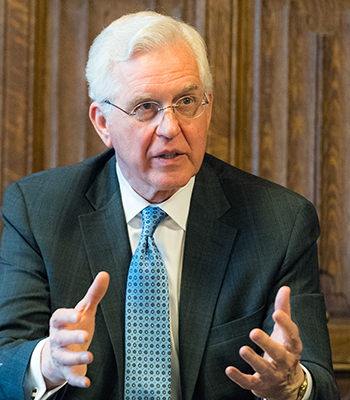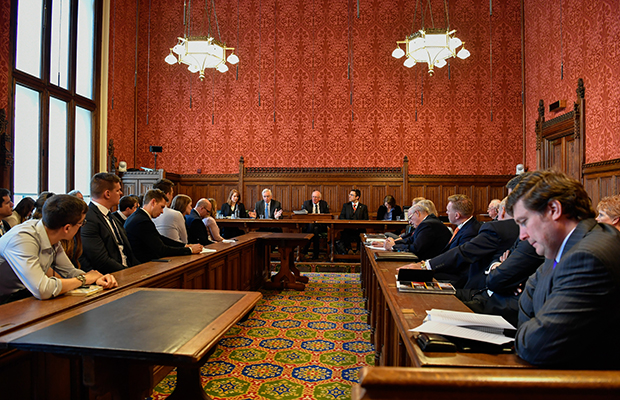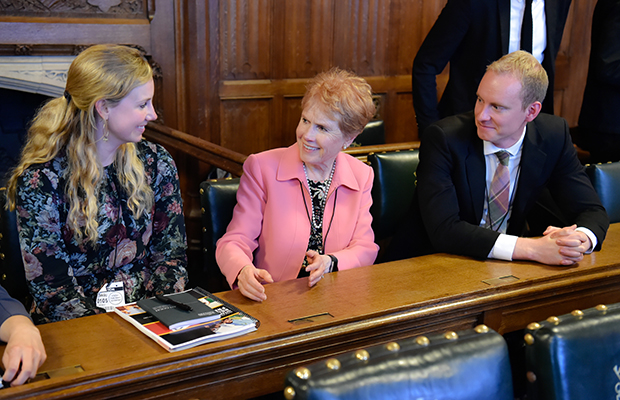Elder Christofferson Explains Why Atheists (and Everyone Else) Should Support Freedom of Religion
Contributed By R. Scott Lloyd, Church News staff writer

Elder D. Todd Christofferson of the Quorum of the Twelve Apostles speaks during the All-Party Parliamentary Group meeting held at the United Kingdom Parliament on May 1.
Article Highlights
- Freedom of religion is “the root freedom in giving life” to all other freedoms.
“Those who advocate from a religiously informed standpoint should not be intimidated by those who claim they are imposing their religious beliefs on others. Everyone is entitled to put forth their views informed by their values and what they feel will best benefit the community.” —Elder D. Todd Christofferson of the Quorum of the Twelve Apostles
Related Links
LONDON
While freedom of religion or belief is being seen more and more merely as a right to worship rather than a right to freely exercise one’s faith in daily life, and with increasingly concerted efforts to intimidate believers and suppress religious viewpoints and practices, religious liberty should instead be seen as a foundational freedom that sustains other critical freedoms and human rights and is fundamental to societal well-being.
So said Elder D. Todd Christofferson of the Quorum of the Twelve Apostles in a May 1 address in a committee of Parliament in the United Kingdom.
“Freedom of religion benefits not only believers but all of society, whether they know it or not,” he said, “Therefore, all have an interest in protecting this freedom, whether they are believers or not.”
In an address titled—somewhat tongue-in-cheek, he admitted—“Why Atheists (and Everyone Else) Should Support Freedom of Religion or Belief,” Elder Christofferson listed three major benefits to supporting freedom of religion or belief:
- Religious freedom supports and strengthens the rule of law.
- Freedom of religion or belief is foundational to other fundamental and cherished freedoms.
- Religion or belief—freely exercised—promotes civic virtue and is vital to strong, flourishing communities.
Elder Christofferson spoke May 1 before the All Party Parliamentary Group (APPG) for Freedom of Religion or Belief. One of the co-chairs for the roundtable presentation was Baroness Elizabeth Berridge, whom Elder Christofferson had welcomed to Washington, D.C., last fall when she was honored by the J. Reuben Clark Law Society with its annual Religious Liberty Award for her efforts in freedom of religion.
This APPG session was conducted by Jim Shannon, an MP from Northern Ireland and APPG chair, who also spoke, along with Dr. Daniel Mark, chair of the U.S. Commission on International Religious Freedom, and Margaret Galey, of the Foreign and Commonwealth Office’s Human Rights and Democracy Department.
May 1 marked Elder Christofferson’s third such prestigious address in the United Kingdom in less than a year. In June at the University of Oxford, he presented a lecture on integrity and public service, drawing upon his experiences as a law clerk to U.S. District Court Judge John J. Sirica as he presided over the Watergate trials of the early 1970s. (See related story.) And in August, he visited Cambridge to speak on religious liberty, the same as the May 1 topic in British Parliament. (See related story.)
Of religious freedom supporting and strengthening the rule of law, Elder Christofferson noted the important role of separation of religious authority from state authority, which in turn has further protected and secured religious freedom from arbitrary governmental authority and persecution. “Continued governmental recognition of the independent estate of religious institutions and individual belief is crucial to the continued vitality of the rule of law,” he added.

Elder D. Todd Christofferson of the Quorum of the Twelve Apostles speaks. Photo by Simon D. Jones.

Dr. Daniel Mark, chair of the U.S. Commission on International Religious Freedom, addresses the group. Photo by Simon D. Jones.
He tied religious freedom to the freedoms of worship, association, expression and opinion, assembly, arbitrary arrest and detention, and interference in home and family, saying all rights and liberties are mutually supportive, with freedom of religion as “the root freedom in giving life to all others.”
“Why? Because a government that is powerless to compel religious belief or exercise will be hard pressed to compel orthodoxy in other areas of life,” he added. “Religious freedom protects the freedom of individual belief and expression in all areas of human activity. This enables people to develop and express their own opinions in matters of philosophy, politics, business, literature, art, science, and other areas, which naturally leads to social and political diversity.”
The rights of church autonomy—to determine its own theology, establish membership standards, own and manage sacred properties, and associate freely in volunteer associations—are seen not only in nonprofit religious organizations but similarly in nonprofit secular organizations as well.
“In short, the hard-won right of churches to have autonomy in their ecclesiastical affairs has helped lay the groundwork for the right of all people—religious or not—to freely form and govern numerous social and cultural institutions that enrich our societies in so many ways,” Elder Christofferson said.
Highlighting how religious freedom connects to the rights of free speech, free expression, freedom of the press, and freedom peaceably to assembly, he noted basic freedoms tend to rise and fall together.
“Courts that protect religious freedom tend to protect the freedom of speech and press, while courts that allow the government to infringe religious freedom sooner or later tend to allow the infringement of other basic rights,” he said. “Conflicts over freedom of religion or belief are the focal point whether the state either safeguards or invades the space necessary for liberty. If the state can be convinced—or compelled—to leave space for religious dissent, it will almost surely leave space for other forms of dissent. If the state does not respect religious freedom, it will not likely respect other core freedoms.”
Of freedom of religion and civic virtue, Elder Christofferson said the former is critical “because it allows religion to inculcate the virtues and habits necessary for a free society and it promotes healthy civic engagement. Religious conscience encourages the virtues and habits of good citizenship that are necessary for a free society—honesty, duty, moral self-discipline, sacrifice for family and country, compassion and service toward others, civic engagement.”
He spent time listing how studies show that individuals of religious commitment and belief are active, engaged, and contributing members of the community, with decreased instances of crime and violence, increased instances of self-sufficiency and humanitarian assistance, strong and stable marriages, and families with commitment to educational pursuits.
In standing up for, protecting, and promoting freedom of religion or belief, Elder Christofferson cited the power of example, the importance of supporting other agencies in similar efforts, and speaking out while encouraging others to do the same.
“Public discussions about the common good are enriched by men and women who routinely put duty above convenience and conscience above personal advantage,” he said. “Those who advocate from a religiously informed standpoint should not be intimidated by those who claim they are imposing their religious beliefs on others. Everyone is entitled to put forth their views informed by their values and what they feel will best benefit the community.”
He added: “We live in challenging times. But these are our times. This is our moment to defend our fundamental freedoms. With courage, conviction, and civility, I believe we can, individually and collectively, make a profound difference.”

The All-Party Parliamentary Group meeting held at the United Kingdom Parliament on May 1. Photo by Simon D. Jones.

Sister Kathy Christofferson, center, chats with attendees. Photo by Simon D. Jones.
